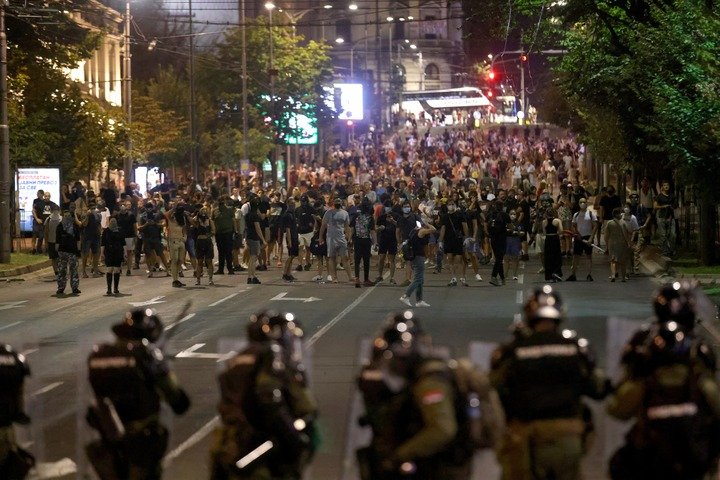
A stand-off between anti-government protestors and riot police in Belgrade, Serbia, 15 August 2025. Photo: EPA / ANDREJ CUKIC
Russia’s Foreign Intelligence Service on Monday accused the EU of carrying out “subversive activities” to fuel ongoing anti-government protests in Serbia, with the ultimate objective of triggering a so-called “colour revolution” that would end the 12-year rule of President Aleksandar Vučić.
In a statement, the agency accused the “European liberal mainstream” of financing NGOs and independent media to “brainwash Serbian youth” against Vučić’s government, in order to install a leadership that would be “obedient and loyal to Brussels”.
“It must be acknowledged that the European elites are succeeding in many respects: young people are becoming radicalised, moving from peaceful protest to ‘revolutionary’ methods of struggle and violence”, the statement continued, drawing parallels with Ukraine’s 2014 Maidan Revolution, which led to the ouster of pro-Russian President Viktor Yanukovych after months of mass demonstrations.
However, attempts to destabilise the Serbian government were “faltering”, it claimed, due to “strong patriotic sentiment [and] the unifying influence of the Serbian Orthodox Church”, as well as residual anti-Western feeling, which it attributed to the 1999 NATO bombing campaign against the country.
Serbia’s ambassador to Moscow, Momčilo Babić, told Russian state news agency TASS on Tuesday that Belgrade was paying “very close attention” to the reports, which he said it would be “very irresponsible to ignore” as Russia had the “best intelligence services in the world”.
Since a concrete canopy collapsed at the main train station in the country’s second city, Novi Sad, in November, killing 16 people, Serbia has been gripped by mass protests against corruption and media censorship.
Monday’s statement echoes previous remarks by senior Kremlin officials, who said as the protests intensified this summer that Russia was closely monitoring the situation and accused Western powers of trying to escalate tensions in the Western Balkan nation.
Vučić himself has repeatedly insisted that the protests against his rule have been orchestrated from abroad and has vowed that he will not bow to the protestors’ demands.
Since Russia’s full-scale invasion of Ukraine in 2022, Belgrade has maintained a delicate relationship with Moscow, not joining Western sanctions due to its continuing dependence on Russian oil and gas, while repeatedly affirming its support for Ukraine’s territorial integrity.
Earlier this year, Vučić was one of just two European leaders to travel to Moscow for Russia’s Victory Day celebrations in May, before making a surprise first-ever visit to Ukraine for a regional summit a month later.
